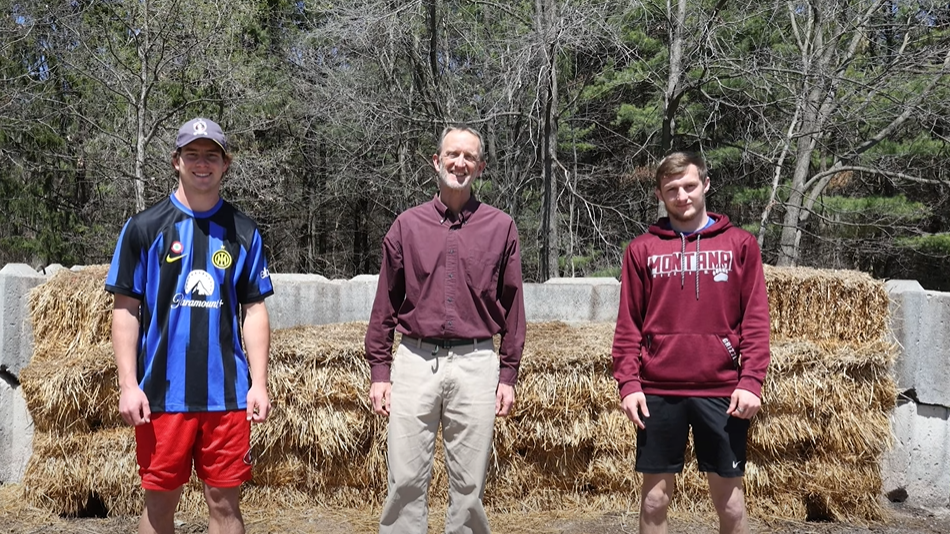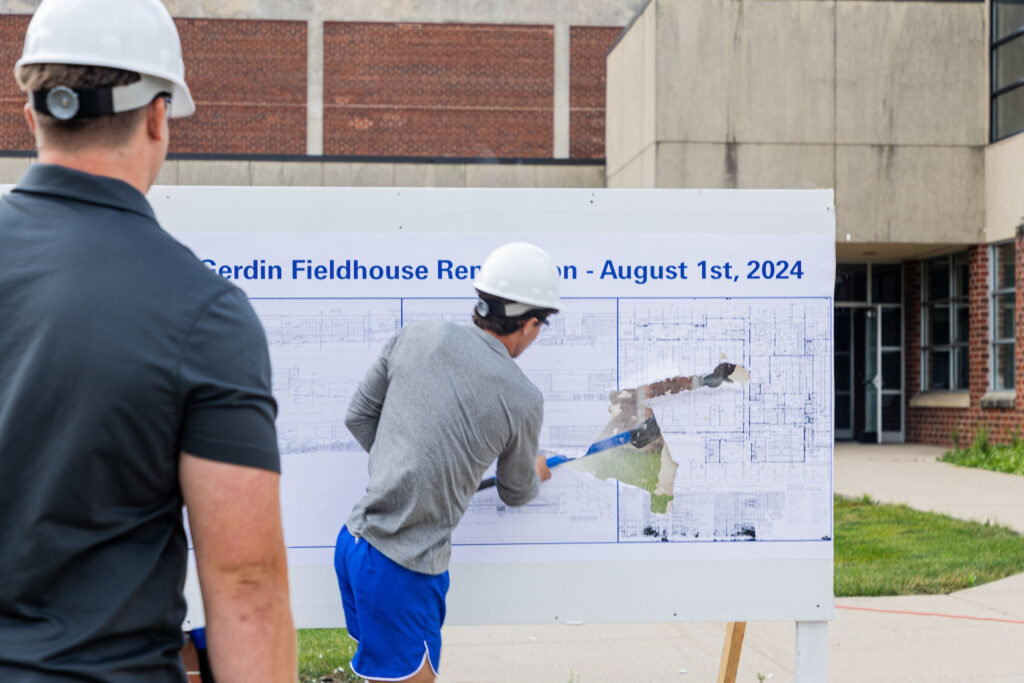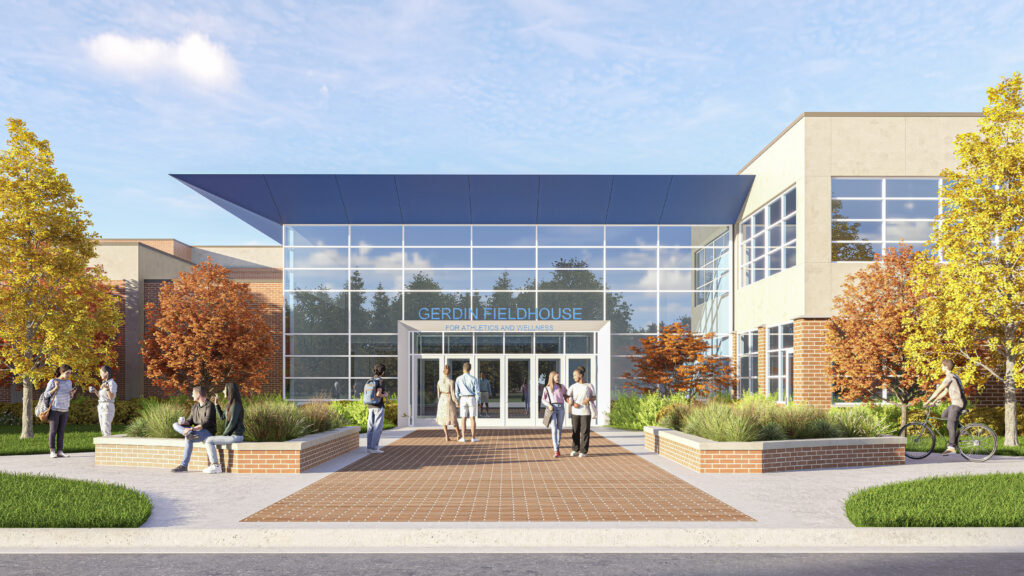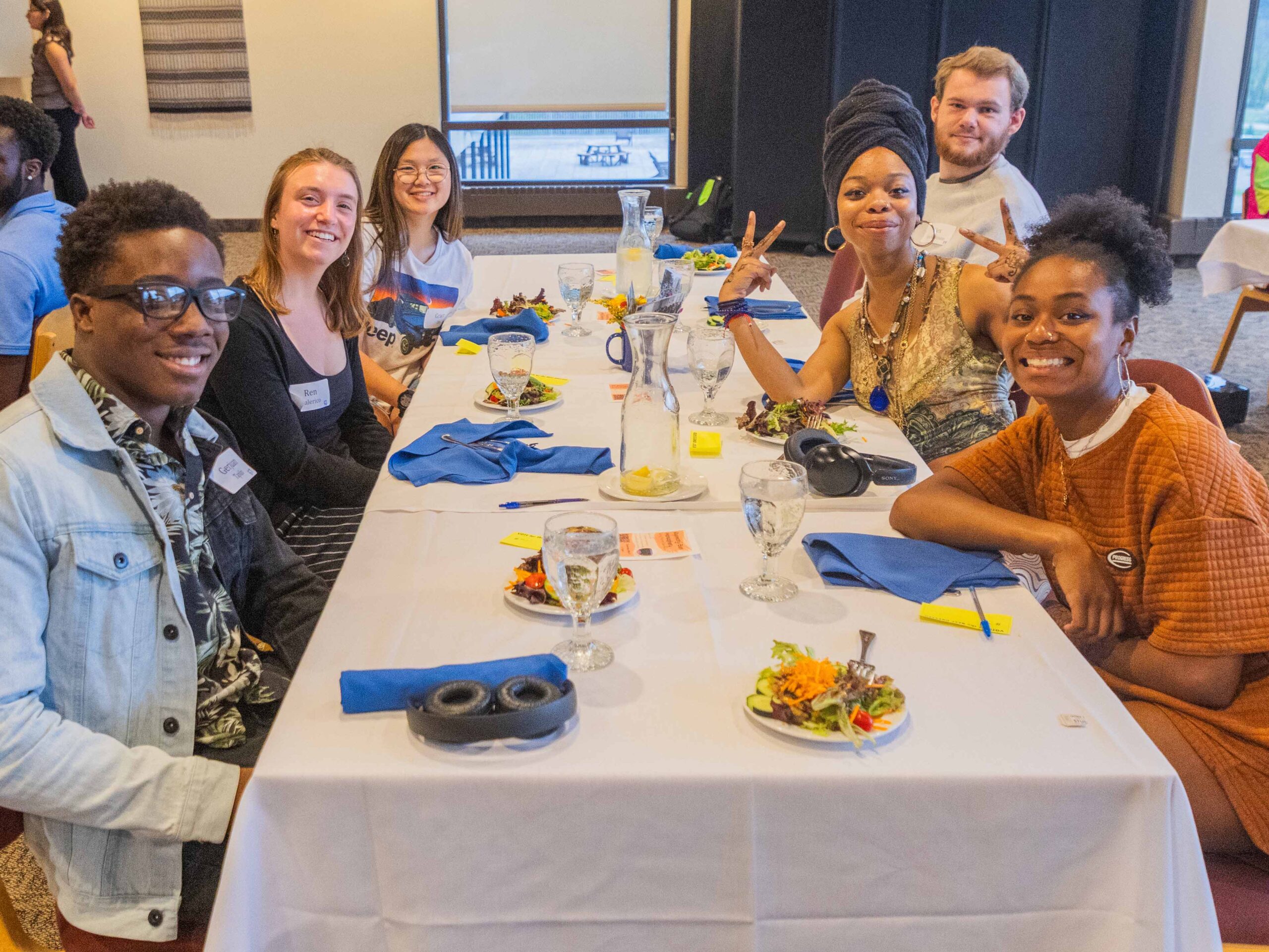Fall Registration 2024
Decorah Parks and Recreation fall activities open for registration on Thursday, August 15th at 8:00am!
Building Local Community Through Arts, Cultural, and Recreational Events, and the Exchange of Goods and Services
Decorah Parks and Recreation fall activities open for registration on Thursday, August 15th at 8:00am!
Every day in the Luther Cafeteria, potential food waste is diverted to make rich compost to replenish the land, and prepared food that was not served is repackaged to serve food insecure people in Decorah and surrounding areas. A Luther video highlights how the college is reducing food waste, motivated by its commitment to environmental and civic sustainability.
This work toward the college’s Zero Waste goal exemplifies Luther’s Civic Sustainability Initiative. Since 2020, this Luther initiative has developed partnerships between student, faculty, and staff groups and similarly minded organizations in the Decorah and northeast Iowa community.
This video highlights how the college is reducing food waste, motivated by its commitment to environmental and civic sustainability.
“Food waste used to be the largest element coming from Luther’s Union and going into the landfill,” said Jon Jensen, director of the Center for Sustainable Communities which runs the Caf to Community program. “Composting is the best and most ecological way to deal with our food waste.”
Located in the Dahl Centennial Union, the Luther Cafeteria (commonly known as the Caf) is the resident dining hall.
Notably, the Luther Caf has no trash cans. Instead, the Caf staff separates all compostable food waste and napkins in the dish room, where they are rinsed into a trough, sent into a pulper, and collected in buckets. Compostable scraps created in the food preparation process (such as stems and peels) are also collected by the Caf staff for composting.

Jon Jensen (center), director of the Center for Sustainable Communities, and two student sustainability workers stand at the composting site on the Luther farm.
Some of the food waste is taken to the Luther farm, which is on the edge of campus. There, Luther has its own compost pile for food waste. Student workers in sustainability collect compostable food waste from bins throughout campus and from the Caf and bring it to the Luther farm.
Luther has also worked with the city of Decorah to compost its food waste. The city worked with residents to develop a sustainability plan, which includes the city being zero-waste by 2040. To achieve this goal, the city received a grant to reduce food waste in the Winneshiek County Landfill.
“As part of this grant, one of the community partners was Luther College,” said former city engineer Jeremy Bril. “The city is working with Luther to collect some of the food waste that Luther’s already collecting on campus.”
About twice a week, city workers come to collect food waste and take it to the city’s yard waste site. The city collects an average of 2,000 pounds of food waste from Luther.
Luther also has the Caf to Community program, which aims to ensure good food goes to people who need it — another way to reduce food waste. This program not only strengthens Luther’s environmental sustainability, but also extends the notion of civic sustainability and builds communities of mutual support.
Because Luther serves buffet-style food prepared in advance, some of the food is left over and not served. Caf to Community volunteers collect this unused food and repackage it into single-serving frozen meals. It is delivered to local pantries such as the Decorah Community Food Pantry and Northeast Iowa Community Action.
Caf to Community is a student-run program. Rising senior Owen Matzek has been the assistant manager of the program. He will take over as manager in fall 2024.
Luther College is proud to announce the 2024-25 Center Stage Series, which annually presents outstanding performances to uplift, inspire and expand your world. Season tickets are available now for six exciting performances by international artists from September 2024 through April 2025. Individual ticket sales start Aug. 19.
The 2024-25 season performances are:
All Center Stage Series performances are held in Luther’s Center for Faith and Life at 7:30 p.m.
Tying the season’s diverse programs together is the theme of migration and the commemoration of the first organized migration from Norway to North America 200 years ago. Luther is the first U.S. college founded by Norwegian immigrants.
“This commemorative year gives us a chance to honor the strength it takes to leave home for the unknown and to better understand the migration of people that continues today,” said Kristen Underwood, director of campus programming. “Whether immersing yourself in the rollicking sounds of Venezuela or Ireland, the colors and perspectives of the American Southwest, or the artistry of the Ailey II dancers, we hope you will find moments of joy and awe.”
Tickets and more information about each of the performances can be found at tickets.luther.edu.
The Center Stage Dinner Series offers a gourmet three-course dinner before each show in the Peace Dining Room, overlooking lower campus and the Upper Iowa River. Beer and wine are available for purchase. Information for the dinner series can also be found at tickets.luther.edu, with menus posted two weeks before the corresponding event. Luther chefs can easily accommodate dietary restrictions when notified in advance.
Season subscribers may choose five or six performances, as well as five or six Center Stage Dinners, before September 27 to waive any ticketing fees and receive 15% off.
The Center Stage Series also offers matinees for school groups and families.
To reserve tickets for a matinee performance, contact Bradley Phillips at phillibr@luther.edu or 563-387-1293. Financial support is available for school group tickets and transportation; additional community members are welcome as space allows. To request financial support for school groups, email programming@luther.edu.
The Center Stage Series is made possible by the generous support of major season sponsors, including Emplify Health, WinnMed, Decorah Bank and Trust, Minnesota Public Radio, John W. Kurtich Foundation, and Luther College Music, with support for student matinees from Dragonfly Books.
Surrounded by more than 90 prospective student-athletes and their families, Luther College current student-athletes broke a wall to mark the launch of construction on the $24 million Gerdin Fieldhouse for Athletics and Wellness.
The event on August 1 marked a historic day for the college in two ways, as it coincided with the inaugural Norse Athletic Prospect ID Showcase.
President Jenifer K. Ward and Director of Athletics Renae Hartl presided over the event.
“Today, we mark the start of renovations of what has been known for a long time as the Regents Center, but thanks to the generosity of our ’92 basketball alumni donor Mike Gerdin; his wife, Nicole; and the Gerdin Family Foundation, it will be known as the Gerdin Fieldhouse,” Ward said. “To our visitors today, as you take your campus tour, keep in mind that you will be among the first generation of students to practice, train, compete and gather with fellow student-athletes at Luther College in this new space.”
With original sections of the 200,000-plus-square-foot facility dating to the 1960s, the project is an extreme makeover of the majority of the interiors. As most of the work involves gutting and rebuilding, a wall breaking was held rather than a ground breaking.
“The new locker rooms, athletic training and rehab area, competition arena and wrestling complex will be a game changer for our Norse student-athletes,” Hartl said. “We wanted to have this ceremony today to kick off the fall for our current Norse, and to show the next generation of Norse what is on the horizon.”

Jack Bell takes a swing of the sledgehammer at the Gerdin Fieldhouse wall breaking ceremony, August 1, 2024.
Three current Luther Norse athletes—all-conference soccer goalie and NCAA qualifying diver Jack Bell of Madison, Wisc.; all-conference and NFCA All-Region first base softball player Riley Sauser of Cedar Rapids, Iowa; and 2024 all-American wrestler Walter West of Plymouth, Minn.—took swings at a ceremonial wall which displayed some of the original facility blueprints from the mid-1960s.
“We are extremely proud to have alumni and donors who are stepping up to make this happen,” Sauser said.
“The locker rooms and team room sketches look amazing,” Bell said. “These will be great spaces for our teams to bond, train and have fun.”
“I think I’m most excited about the air conditioning in the arena and the construction of the new wrestling room,” West said. “President Ward, how fast can we get this going so the three of us can start using it?”
President Ward recognized representatives of Opus Design Build, senior vice president for construction Jeff Smith and the Gerdin project manager, Jeremiah Cunningham, who were in attendance representing Opus and their project partner RDG Planning and Design, as well as Luther College’s director of facility services, Jay Uthoff, who will be the college’s project manager.

An artist’s rendering of the north entrance to the Gerdin Fieldhouse for Athletics and Wellness.
The opening phase is a new north lobby entrance for the facility, which will include a new concession stand, new restroom facilities for events, and an expanded lobby experience that will salute the spirit of all 21 Luther varsity teams and provide a new home for the athletic Hall of Fame. The second phase of work will renovate numerous team locker rooms and other athletic department support areas.
This academic year, Norse teams will compete a final season on the existing gym floor, with ceremonies tentatively planned to turn out the lights on the historic space in late February. The conversion of the space into an arena configuration, including the Birkestrand Family Court, will begin immediately afterwards.
The first three phases of work will focus on the interior renovations of the former Regents Center. The planned fourth phase is the construction of a new wrestling workout area which will add additional space to the complex.
With work set to begin within the month, fundraising for the project continues, particularly for phases two through four. Leadership gifts made in 2023-24 have given the renovation campaign sufficient momentum to begin.
“We’ve surpassed 60 percent of our newly-expanded fundraising goal and are striving for full funding by the end of 2025,” Vice President for Development Mary Duvall said. “We invite additional investment from alumni and friends who wish to partner with Luther in this transformative facility renovation.”
To learn more about how individuals can help Luther reach its goal, contact the Development Office at development@luther.edu. To see more details of the phases and to watch a video related to this announcement, the entrance rendering and the wrestling training facility concept drawings, go to the Gerdin Fieldhouse Renovation page at luthernorse.com.
Pledge of Allegiance
9:30 a.m. Scott Logsdon – Recycling Supervisor
Re: department updates9:45 a.m. Michael Kueny – County Engineer
Re: road updates10:15 a.m. Miscellaneous
– Discuss Purchase Agreement for Smith building / Public Health generator disposition10:30 a.m. Public Hearing – Storlie/Bohr/Novilla Rezoning request
– Consideration of comments and possible actionConsent agenda: approve minutes, approve claims, accept and file departmental reports, approve liquor licenses, approve fireworks permits. Any matter on the Consent Agenda will be removed from the Consent Agenda and discussed as a regular agenda item upon the request of any Board member.
Community Services Building Updates
Committee reports

WinnMed is pleased to welcome Brittanee Samuelson, M.D., home to northeast Iowa as she joins the Mayo Clinic Health System medical practice to provide specialized hospital medicine.
Dr. Samuelson earned her undergraduate degree from the University of Wisconsin-Platteville and her medical degree from the American University of the Caribbean School of Medicine. She completed her residency in Family Medicine at Mayo Clinic in Rochester.
In Decorah, Dr. Samuelson will serve as WinnMed’s first full-time hospitalist. Hospitalists are doctors who specialize in treating hospitalized patients. Their focus is to diagnose and treat patients in an inpatient setting, coordinate care with specialists and attend emergencies that may arise.
Dr. Samuelson will be the only full-time hospitalist at WinnMed and joins her family medicine colleagues who currently provide hospitalist services on a rotation, along with their clinical practices.
Dr. Samuelson says, “When patients are admitted to the hospital and under my care, they can expect a comprehensive and compassionate approach to their inpatient experience. From the moment they are admitted to the hospital, they’ll encounter a welcoming and supportive atmosphere where their concerns are listened to with empathy and understanding.” She adds, “Throughout their stay, I will ensure clear and transparent communication, discussing their diagnosis, treatment plans, and any necessary procedures in detail to empower them in their healthcare decisions. Collaboration with multidisciplinary teams (specialists, social work, nursing, physical therapy, pharmacists, primary care physicians, etc.) is a cornerstone of my practice, guaranteeing seamless coordination of care and the best possible outcomes.”
She says “Growing up on a farm instilled in me a strong work ethic and a deep appreciation for the value of family and community. As a dedicated hospital medicine physician at WinnMed, I will bring those values, along with a unique blend of compassion and expertise to my practice, patients and their families.”
Thomas Marquardt, D.P.M, chief medical officer of WinnMed says, “WinnMed continues to grow in the services we provide to patients. We are thrilled to add Dr. Samuelson to our committed team of physicians to help expand our hospital services to patients across the region.”
On June 27, the WinnMed Board of Trustees responded to a notice provided by Mayo Clinic Health System (MCHS) that the current Management Services Agreement (MSA) with WinnMed will not be renewed when it expires on July 1, 2025. Additionally, MCHS had voiced intentions to the WinnMed Board of Trustees to engage in negotiations with WinnMed leaders to develop a modified, long-term Professional Services Agreement, which would take effect in July 2025 for the MCHS physicians who practice at WinnMed.
At the June 27 meeting, the WinnMed Board of Trustees voted to appoint Steve Slessor, the chief administrative officer under the MSA, as the new WinnMed chief administrative officer. Slessor accepted their offer and began his WinnMed employment July 3, 2024.
Slessor and Dr. Tom Marquardt, chief medical officer of WinnMed, provide insight and information to patients and the broader region regarding the transition.
Slessor says, “Even as an administrator, I am fully aware that what the community cares about is not contracts related to how the hospital is managed, but rather the relationship with their clinician and the quality of care they receive. We fully expect that through a variety of options, none of that will need to change. We have a wonderful team of 600 plus employees and physicians that are here ready to provide high quality care and services as you have come to expect. While our path may be altered by this change, we still have many paths to success open to us and are confident we have the team and culture to continue to move this organization forward. My decision to join WinnMed as a direct employee through this change was an easy one due to this team, this community, and our future opportunities.
Dr. Marquardt comments, “As a Mayo physician in this community for nearly 20 years, I can speak for myself and my colleagues that this is home. As a practice, it is our intent to continue to provide the same level of care and services our community is used to.
Luther College has become one of 80 new members of the FirstGen Forward Network, formerly known as the Center for First-generation Student Success. Among Iowa institutions, Luther joins the University of Iowa, Iowa State University and Drake University in the 429-member nationwide network.
To be selected as a FirstGen Forward Network Member, Luther College displayed a demonstrated commitment to improving experiences and advancing success for first-generation college students.
The FirstGen Forward Network empowers higher education institutions to benefit first-generation college students in many ways, such as advancing their academic and co-curricular outcomes and building more inclusive institutional structures. First-generation students are those whose parents or guardians have not completed a 4-year college degree. They come to college with a unique set of strengths as well as challenges. At Luther College, 21 percent of the student body was first generation as of last fall.

Ann Smith, assistant dean of student success and director of disability services
“We are very honored to have been selected for membership in the FirstGen Forward Network, and we are excited to maximize the opportunities this partnership will allow,” said Kate Elliott, Luther’s dean of student success. “I want to publicly commend my team in the Office of Student Success, especially Dr. Ann Smith, assistant dean and director of disability services, and Dr. Jennifer Hanifl, director of TRIO Student Support Services.”
“We are pleased to welcome Luther College into the network,” said Sarah E. Whitley, executive vice president with FirstGen Forward. “Through the application process, it was evident that Luther College is not only taking steps to serve first-generation students but is prepared to make a long-term commitment and employ strategies that foster an environment of success for this important population.”
“Being named as a Network Member in the FirstGen Forward Network is an exciting opportunity for Luther College to join a dedicated community of professionals prepared to share evidence-based practices and resources, troubleshoot challenges, generate knowledge, and continue to advance the success of first-generation students across the country,” said Maurice Jones, CEO of FirstGen Forward. “We are excited to see a groundswell of activity from the Class of 2024 Network Members and know Luther College will be a significant contributor.”

Jennifer Hanifl, director of TRIO Student Support Services
A commitment to first-generation college students is personal for several key Luther staff members. Smith and Hanifl, as well as Provost Brad Chamberlain, were all first-generation college students in their own families. Smith and Hanifl will serve as Luther’s leadership team for FirstGen Forward. “Because of our personal experience as first-gen students, we are especially excited about this program and the resources it will bring to help our current generation of first-gen students,” said Hanifl.
Both Hanifl and Smith have extensive professional experience working with the first-generation population. Before Luther, Hanifl was the director of the first-generation initiatives student program at Saint Mary’s University in Winona, Minn. As Luther’s director of TRIO Student Support Services, she serves first-generation college students, as well as income-eligible students and students with disabilities. Ann Smith supports TRIO in her role as assistant dean and works directly with providing services for students with disabilities at Luther. Luther has an over 50-year history with the federally funded TRIO programs.

At the 2024 TRIO Student Support Services banquet, students show the community they have formed in the program.
First-generation students in TRIO SSS are more likely to persist in their education, compared to their peers not in the program, largely because of TRIO’s support services. Based on federal funding levels, however, Luther’s TRIO program is able to serve less than half of Luther’s eligible first-gen students. “Of the 216 first-generation college students at Luther College in spring 2024, only 91 first-gens (approximately 42%) were served by the TRIO Student Support Services program,” said Hanifl. “The FirstGen Forward program will allow us to have nationwide support for more programming opportunities and, hopefully, funding to build out support for first-gens not in TRIO.”
She envisions programming such as persistence and academic recovery workshops, community-building, mentoring and networking geared toward first-generation students. “We will spend time digging deeper into what the students’ needs are,” Hanifl said.
The FirstGen Forward program has three phases. After successful completion of the Network Member phase, institutions may progress to the second phase, FirstGen Forward Network Leader. Ultimately, all network institutions strive for national leadership as a FirstGen Forward Network Champion.
Hanifl is excited to work toward the champion phase of the network.
“It’s all about creating community,” Hanifl said. “Luther is a wonderful community, but everyone needs a niche or group of their own. That’s what we are trying to create. Everyone needs a cohort or a family and a place that they can call their home away from home.”